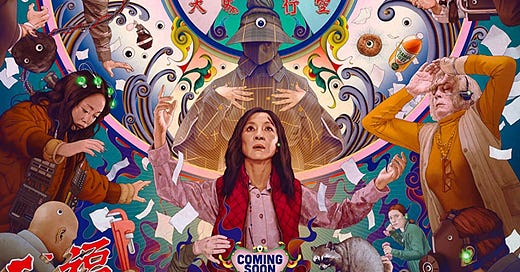While my husband was driving us home yesterday after we saw the recently released “Everything Everywhere All At Once,” I messaged a friend and told her to clear her schedule this weekend to go see the film. She replied that she was kind of busy this weekend, what with being clergy and this weekend being Easter.
I suggested that she should just cancel church and see the movie instead.
It was a joke, but also, I don’t know if that’s a terrible idea.
***
Daniels Kwan and Scheinert set out to make a movie about everything; the “too-muchness” of the world. They began writing the script in 2016, the start? culmination? of a season of deep turmoil here in the USA. They looked around and saw too much. Too much division. Too much fear. Too much anger. Too much everything, and they decided to make a movie about it. To make a movie about everything.
And friends, they really did it.
What if we had access to infinite versions of ourselves? What if we could tap into the memories and knowledge and experiences that every different choice could lead us to? How would we use that ability?
The main antagonist has tapped into every version of themself and the chaos that creates. This is not Walt Whitman’s recognition that each of us contains the past versions of ourselves, and the inherent contradictions that we create simply by moving through our lives, but rather the containment of every possible version of every life in a single person. The ”too-much” version. A version that can’t see value to any life, because they see the futility of all of it. Seeing more that makes you smaller and more insignificant.
The question becomes, how do we defeat that? How do we defeat nihilism? How can we imbue meaning into a life where every choice leads to some version of pain? Where every positive outcome is the result of a painful decision and some other loss?
The antagonist sees annihilation as the only out. In the face of everything, the only choice can be the void. To leave everything behind and embrace nothing.
***
The Christian tradition starts with the story of the Garden of Eden. In it, Eve is tempted by the snake to eat from the tree of the knowledge of good and evil. The desire to be like God and to know everything led to the original sin. Too-much right from the jump, so to speak.
The story of Easter is that of creating a balance. Of bringing that too-muchness back to simplicity. The story of Jesus of Nazareth is the story of abandonment of the power of God to become human, to live a simple life, and to die. And through that simple, solitary, painful, yet beautiful existence, salvation is found.
Access to everything isn't power. The closed fist isn’t power.
The truest power was kindness. The truest power is kindness.
***
I have a complicated relationship with American Christianity. The desire for everything that I see in much of American Christianity and the closed fist that I see in much of American Christianity, often leads me to a sense of nihilism. Despite this, it is still the tradition that I know and however grudgingly, love.
Maybe you can’t do that. Maybe there’s just not enough in American Christianity to make it worth your while. Maybe the thought of another Easter service is just another version of too-much, but the story of love and kindness in the face of everything that seeks to harm still resonates.
If that describes you, then yes. Clear your schedule and go see “Everything Everywhere All At Once.” It might be the Easter sermon you’ve been waiting for. It might be the Easter sermon we all need.




